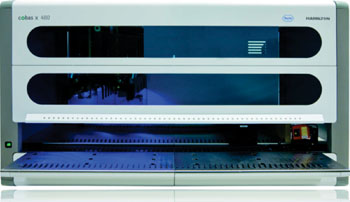HPV Test Approved for Primary Screening of Cervical Cancer
By LabMedica International staff writers
Posted on 05 May 2014
A newly approved molecular test offers women an alternative option for cervical cancer screening and this most recent approval means the test can now be used as the first port of call for cervical cancer screening for women aged 25 years and over. To date, the two main techniques used for cervical cancer screening were liquid-based cytology, and the most common form of cervical cancer screening, the Papanicolaou (Pap) test, also referred to as a cervical smear test.Posted on 05 May 2014
The US Food and Drug Administration (FDA; Silver Spring, MD, USA) have approved the first human papillomavirus (HPV) DNA test for primary cervical cancer screening. The cobas human papillomavirus (HPV) test can detect 14 types of HPV that present high risk of cervical cancer. Specifically, the test identifies HPV 16 and HPV 18, the two types that are responsible for around 70% of cervical cancer cases.

Image: The cobas 4800 Detection System (Photo courtesy of Roche Molecular Systems).
If the test detects HPV 16 or HPV 18, a patient will be required to undergo a colposcopy, where a device is inserted into the cervix and illuminates and magnifies the area, allowing direct observation of cervical cells. If the cobas HPV test, which was developed by Roche Molecular Systems (Pleasanton, CA, USA) detects any of the other 12 high-risk HPV types, patients will then be required to have a Pap test, which will determine whether they need a colposcopy.
A study conducted by Roche involving more than 40,000 women, has shown that the cobas HPV test is safe and effective. The women in study were aged at least 25 years and underwent a cobas HPV test and a Pap test. Women whose cervical cells screened positive for HPV using the cobas HPV test or who had a positive Pap test, as well as women who had negative Pap and HPV tests, had a colposcopy and cervical tissue biopsy. Biopsy results were compared with both the cobas HPV test results and the Pap test results. The study found that the cobas HPV test could accurately identify HPV 16 and HPV 18 in women, therefore predicting a woman's risk for cervical cancer.
Alberto Gutierrez, PhD, of the FDA's Center for Devices and Radiological Health, said, “This approval offers women and physicians a new option for cervical cancer screening. Roche Diagnostics conducted a well-designed study that provided the FDA with a reasonable assurance of the safety and effectiveness when used as a primary screening tool for cervical cancer.”
Related Links:
US Food and Drug Administration
Roche Molecular Systems














